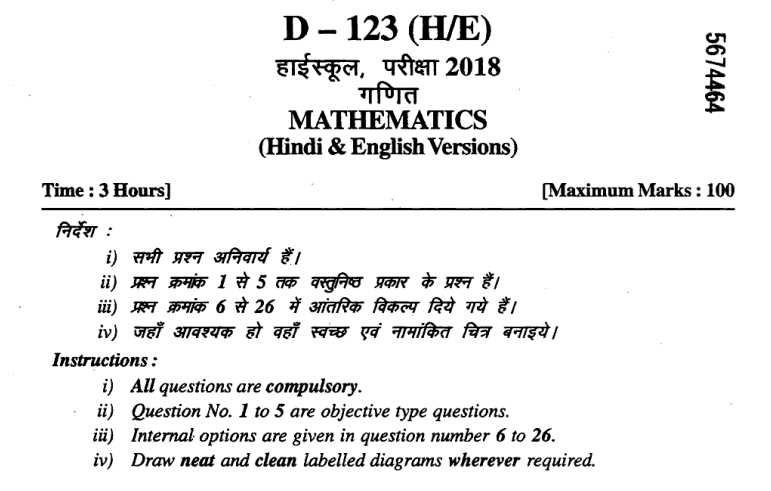MP Board 10th Class Mathematics Question Paper. As you prepare for this important academic milestone, it’s crucial to understand the patterns, familiarize yourself with the syllabus, and refine your strategies to excel in the Mathematics examination.
Table of Contents

MP Board 10th Class Math's Question Paper
| General Structure: | |
| Duration: | 3 hours |
| Total Marks: | Seventy-five marks |
| Sections: | The paper will likely be divided into sections with varying weights. These sections may include: |
| |
| Content Areas: | |
| The exam will encompass topics from the 10th-grade MP Board Maths syllabus, covering the following areas: | |
| Number Systems: | Real numbers, HCF, LCM, simplification, factorization. |
| Algebra: | Basic algebraic operations, linear equations in two variables, polynomials. |
| Trigonometry: | Fundamentals of trigonometry (basic ratios, identities). |
| Geometry: | Concepts of lines and angles, triangles, quadrilaterals, circles, area, perimeter, volume, and surface area. |
| Statistics: | Measures of central tendency (mean, median, mode), frequency distribution. |
| Mensuration: | Calculations involving area, perimeter, and volume of common shapes (cubes, cuboids, cones, cylinders, spheres). |
| Probability: | Basic principles of probability. |
| Preparation Tips: | |
| Review Class Notes and Textbooks: | Ensure a thorough understanding of all concepts covered throughout the year. |
| Practice with Sample and Past Papers: | Utilize online resources or consult with your teacher for sample papers or previous years’ papers specific to the MP Board. This will familiarize you with the format and difficulty level of the exam. |
| Focus on Key Topics: | Concentrate on topics carrying higher weightage in the exam. |
| Address Weaknesses: | Identify areas of difficulty and allocate additional time to practice problems related to those concepts. |
Mathematics Question Paper for Class 10 under the MP Board Syllabus
| Unit | Topics Covered |
| Unit 1 | Number System: Real Numbers, Euclid’s Division Lemma, Fundamental Theorem of Arithmetic, Rational Numbers, Irrational Numbers |
| Unit 2 | Algebra: Polynomials, Linear Equations in Two Variables, Quadratic Equations, Arithmetic Progressions, Coordinate Geometry |
| Unit 3 | Geometry: Triangles, Circles, Constructions, Mensuration, Areas Related to Circles |
| Unit 4 | Trigonometry: Fundamentals of Trigonometry, Trigonometric Identities, Heights and Distances |
| Unit 5 | Statistics: Statistics, Mean, Median, Mode, Construction of Bar Graphs, Histograms |
| Unit 6 | Probability: Probability, Simple Problems on Single Events, Simple Problems on Coin Tossing and Die Throwing |
Significance of Exam Papers 10th Class By MP Board In 2018
| Unveiling the Exam Blueprint: The previous year’s question papers act as a reflection of the actual exam, providing valuable insights into question patterns, the relative importance of different topics in the syllabus, and the level of difficulty. Through careful analysis, you can customize your study approach, giving priority to subjects that need more focus. | |
| Enhancing Your Skills: | Practicing with past year papers replicates the experience of taking practice tests under exam conditions. It assesses your speed, accuracy, and understanding of concepts in a simulated environment, helping you identify strengths and weaknesses in advance. This enables you to fine-tune your strategy and strengthen your grasp of key concepts. |
| Building Exam Stamina: | Given the time constraints often present in MP Board Question papers, success relies on effective time management. Practicing with previous year papers helps improve your endurance and time management skills for the exam. Through timed practice sessions, you learn to manage your time, prioritize questions, and avoid getting stuck on specific problems. |
| Boosting Confidence: | Successfully completing past year papers boosts your confidence and reduces exam-related anxiety. Being able to answer questions correctly validates your knowledge and motivates you to persevere. This positive reinforcement has a significant impact on your overall exam performance. |
| Identifying Patterns: | While exact questions may not repeat, regular review of past exams reveals recurring patterns in topics and question types. This allows you to develop targeted strategies for tackling expected question types in the actual exam. |
| Integrating CBSE Class 10 Question Papers into your study routine is akin to having a powerful tool at your disposal. They sharpen your skills, instill confidence, and provide invaluable insights, greatly increasing your chances of success. | |
Examination Structure: MP Board's Mathematics Question Paper for Class 10
| Question Number | Distribution | Content |
|---|---|---|
| 1 | 5 | Algebra: Resolution of linear equations |
| 2 | 7 | Geometry: Characteristics of triangles and circles |
| 3 | 6 | Arithmetic: Computations related to percentages and profit/loss |
| 4 | 8 | Mensuration: Computation of area and volume |
| 5 | 9 | Trigonometry: Grasping fundamental trigonometric ratios |
| 6 | 5 | Statistics: Understanding mean, median, and mode concepts |
| 7 | 10 | Coordinate Geometry: Grasping concepts of lines and angles |
| 8 | 10 | Algebra: Resolution of quadratic equations |
| 9 | 10 | Probability: Grasping probability concepts |
| 10 | 10 | Number Theory: Understanding real numbers and polynomials |
Section C includes extended-response inquiries that encompass subjects like Algebraic Expressions and Identities, Coordinate Geometry, as well as Statistics and Probability
Section C: Extended-Response Questions
In Section C, students encounter extended-response questions that delve into topics such as Algebraic Expressions and Identities, Coordinate Geometry, and Statistics and Probability. This section tests the depth of understanding and application skills across these mathematical domains. It challenges students to apply their knowledge to solve complex problems and demonstrate proficiency in these key areas of mathematics.
Through Section C, students showcase their ability to analyze mathematical concepts, formulate solutions, and communicate their reasoning effectively. It serves as an opportunity for students to exhibit their mastery of Algebra, Geometry, and Statistical concepts, essential for success in the subject.
